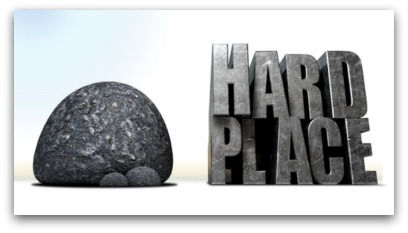The Great Escape From Between A Rock & A Hard Place
- Karan Scott

- Oct 27, 2015
- 4 min read
Updated: Jun 5, 2019
“Don't convince yourself you can't understand something, when at first you don't understand it.
Understanding rarely comes instantly, and it can take time - so no more with the beating yourself up!”
I posted this quote on my Facebook page recently, and it received a surge of positive feedback, which made me think a little deeper on the subject. All too often, when we are faced with understanding new, complicated things - or faced with hard choices of some kind - we assume it's hard because we're not packing enough intellectual peanuts; we must be stupid. Don't get me started on the negative self-talk issue; which I'm going to side step at this time: it's something of a hot button topic for me, and worthy of it's own article. For now though, I'm going to refer back to the headline quote and repeat “understanding rarely comes instantly, and can take time”, so stupid is not in the equation here.
Ruth Chang (philosopher, Rutgers University) teaches us that what makes a hard choice hard, is the way the alternatives relate. For example, when you are presented with an easy choice, one option is clearly better than another option. What makes a hard choice hard, is when one option is better in some ways, whilst the other option is better in others. When there is no clear and overall preference, the over thinking agony has room to move in and set up camp in your mind.
HARD CHOICES
Fear of the unknown is a common motivational default, when we're placed between a rock and a hard place, and can lead us into shrugging ourselves into pursuing the safest – but not necessarily better – option. Taking the safest option because we don't immediately understand, or can't immediately make a selection, can be a mistake, especially if the decision has been fuelled by “too stupid” negative self-talk. We must understand that hard choices are hard because there is no singular best option, but there are other factors we can apply, which may aid our great escape from between our rock and hard place.
When faced with hard choices, there are the scientific properties (i.e.: numbers, mass and hard data), and there are values properties (i.e.: personal growth, joy, well-being); neither relatable to the other. When comparing any two numbers, there are only three possibilities: that one number is greater than, lesser than or equal to the other. Comparing two values properties is not nearly so quantifiable, leading to greater angst at base camp. We simply cannot apply scientific thinking (i.e.: logic and reason) to everything. Sometimes values feeling (i.e.: what gives our children joy and quality of life) must be an equal factor in our deliberations. We must not assume the world of “is” (i.e.: scientific hard data and thinking) has the same structure as the world of “ought” (what we feel we should do). So here's the key for your great escape: you have the power to create your own reasons for choosing one hard choice over another; let me explain.
If we were only ever presented with easy choices, 1) where would our opportunities for growth lie? and, 2) we would be enslaved by reason alone – no need to create or apply our values to our lives; which ultimately shapes who we become. By exercising our normative power – the power to create our own reasons – we open ourselves to the potential of becoming the kind of person we want to be; the authors of our own lives. We may be offered a well paid job in the city, which would satisfy our scientific thinking (i.e.: financial benefits and career elevation), but would our values be better served by opening a petting zoo in the countryside, where our children are free to roam in the fresh air? Our hard choices give us an opportunity to plant our feet and proclaim to ourselves and the world “this is who I am, who I ultimately want to be and where I want to go” when finally making a decision.
This is precisely why we shouldn't do the negative self-talk thing, and beat ourselves up when placed between a rock and a hard place. More often than not there is no one best option, sometimes it's a combi-soup-sandwich, made with a little from each option. Is it written anywhere that your hard choice has to be a Hard Option A or a Hard Option B? Is there the potential to blend them together and create a Hybrid Option AB? Allow a little more fluidity into the proceedings and see what happens.
As with every other aspect of our lives, we should resist looking out there for reasons and answers. Instead, we should be looking inside and asking ourselves “who do I want to be?” When you know who you want to be, you can create reasons to help you settle on Option A, Option B or Hybrid Option AB. The power to create (your reasons) is in your hands; it always has been, and always will be.
The people who choose not to exercise their normative powers, who choose not to take or create a decision one way or the other when placed between a rock and a hard place, are drifters. Drifters prefer not to be the authors of their own lives, they're content allowing the world to dictate their reality. To drift is to be carried slowly by a current of air or water; the continuous slow movement from one place to another.Not making a decision is the same as making a decision to do nothing. Does this sound like a viable option for you?





Comentarios